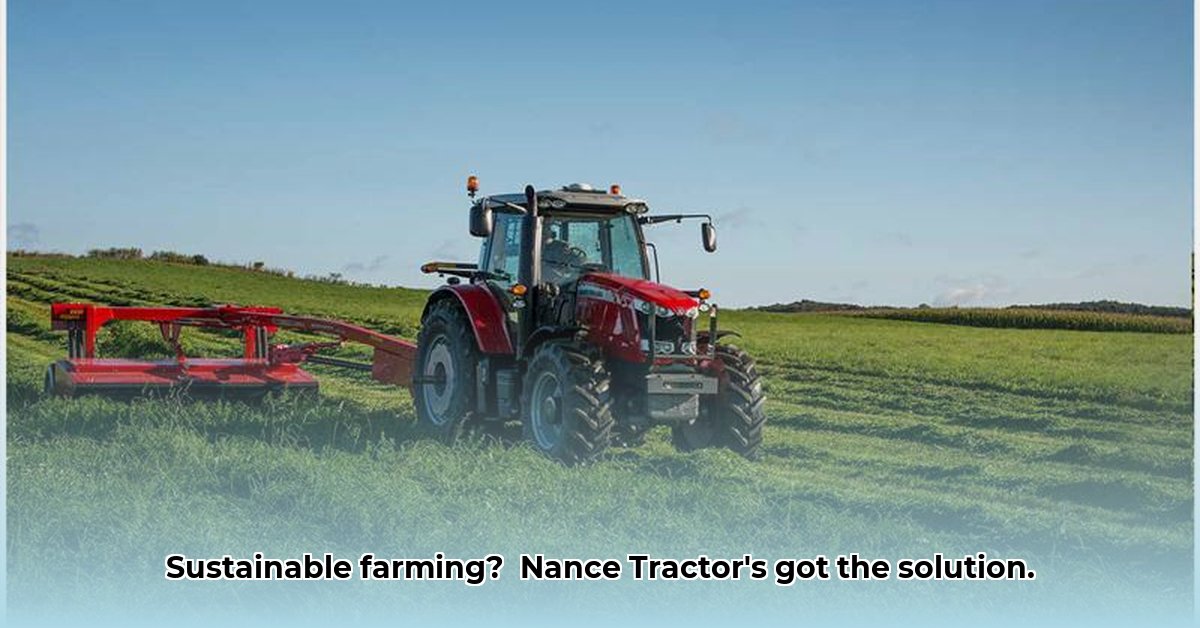
Nance Tractor & Implement, nestled in McConnells, South Carolina, presents a compelling case study in sustainable agricultural practices. Unlike many farm equipment dealerships, Nance Tractor focuses on pre-owned Massey Ferguson machinery, offering a unique approach that benefits both farmers and the environment. This article examines their business model, analyzes its contribution to sustainable agriculture, and proposes actionable strategies for future growth and broader impact. For more information on sustainable farming equipment, check out this helpful resource: Sustainable Farming Equipment.
The Nance Tractor Model: Pre-Owned Power and Personalized Service
Nance Tractor's core strategy revolves around the sale and service of pre-owned Massey Ferguson farm equipment. This isn't simply about offering lower prices; it's a deliberate move towards sustainable agriculture. By extending the lifespan of existing equipment, they significantly reduce the demand for new machinery, lessening the environmental burden associated with its manufacture – a process that's energy-intensive and resource-heavy. Their focus isn’t solely on transactions; they cultivate lasting relationships with local farmers, providing expert advice and maintenance services. This personalized touch fosters trust and loyalty, establishing Nance Tractor as a valuable community partner. Their operation exemplifies the potential of a focused, customer-centric business model within the agricultural sector.
Sustainability Analysis: A Circular Economy Approach
Nance Tractor's model embodies the principles of a circular economy. By repurposing and extending the life of existing equipment, they actively reduce waste and minimize the environmental impact associated with new machinery production. This represents a significant contribution to sustainable agriculture. Farmers benefit from cost savings, while the environment benefits from reduced resource consumption and emissions. However, the model's current geographic limitations restrict its overall sustainability impact, confined largely to the McConnells area. Furthermore, a lack of quantifiable sustainability metrics currently hinders a precise assessment of their environmental achievements. Future research into developing robust methods for measuring the environmental impact of used equipment sales is essential for a comprehensive analysis.
Challenges and Opportunities for Growth: Scaling Sustainability
While Nance Tractor enjoys a strong local reputation, scaling their operation while maintaining their personalized service remains a challenge. Expanding into new markets requires careful planning to avoid compromising the quality of customer relationships that define their brand. Strategic partnerships could facilitate geographic expansion without sacrificing the personalized service that is a core element of their business model. Simultaneously, developing a robust online presence, combined with targeted marketing, can significantly broaden their reach to farmers beyond their immediate geographic area. This expansion requires thorough consideration of appropriate financing strategies and efficient logistical solutions.
Actionable Insights: A Collaborative Approach to Sustainability
The success of Nance Tractor’s model depends on the collaborative efforts of various stakeholders. The following recommendations outline actionable steps for Nance Tractor, Massey Ferguson, local farmers, and government agencies to enhance sustainability within the agricultural sector.
| Stakeholder | Short-Term Actions (0-1 year) | Long-Term Actions (3-5 years) |
|---|---|---|
| Nance Tractor McConnells | Develop a professional website; enhance social media presence; offer expanded services; implement basic data tracking | Explore strategic partnerships; expand into similar markets; invest in detailed sustainability metrics; develop specialized training programs |
| Massey Ferguson | Increase marketing support for Nance Tractor; explore joint initiatives promoting sustainable farming equipment | Develop new sustainable equipment designs; actively support and expand the pre-owned equipment market. |
| Local Farmers | Actively utilize Nance Tractor's services; share positive experiences; advocate for sustainable agricultural policies | Participate in farmer training programs; engage in research on sustainable equipment usage; advocate for supporting policies. |
| Government Agencies | Offer grants or incentives supporting sustainable equipment; fund farmer education programs | Invest in R&D for sustainable agricultural technologies; offer substantial support for farmer training and education programs. |
Conclusion: A Local Model with Global Implications
Nance Tractor & Implement's success offers a powerful example of sustainable business practices in agriculture. Their focus on pre-owned equipment, personalized service, and community engagement provides a replicable model with the potential to impact the wider agricultural sector. While challenges remain in quantifying their specific environmental effects, their approach highlights the significant potential for integrating sustainability principles into a profitable business model, paving the way for a greener future in farming. Further research, particularly on developing standardized metrics for measuring the environmental impact of used equipment sales, is critical to fully understanding and replicating their success.